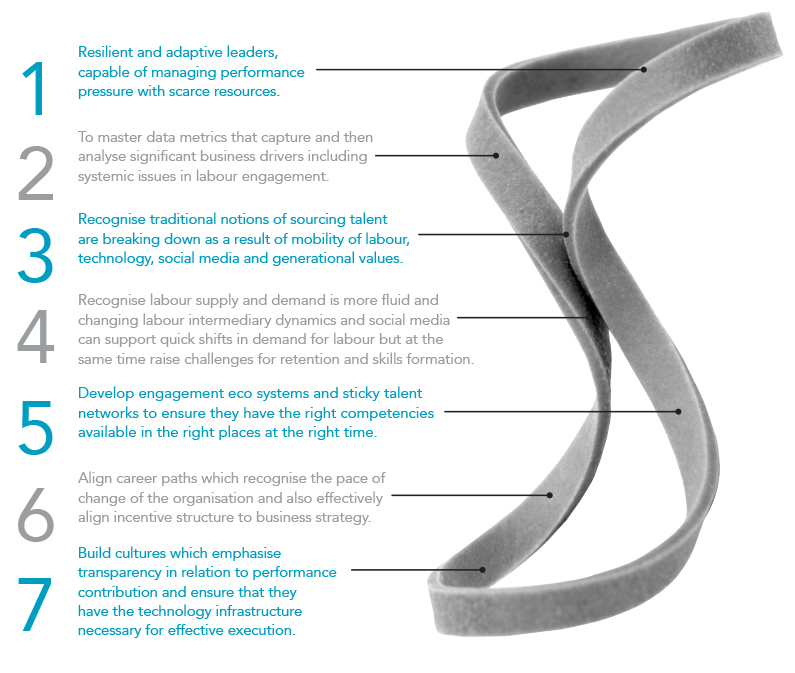The growing need for enterprise flexibility
January 14, 2014FCB’s Managing Partner and Solicitor Director, Campbell Fisher, discusses the need for businesses across all industries to be flexible in the face of challenging business conditions, international competition and rigid industrial relations regulations.
Business conditions in Australia are likely to remain challenging, increasing the need for enterprises to be able to remain flexible to adjust to uncertainty with resilience and adaptability. Leaders that can excel by using scarce resources and consistently achieving a culture of creative tension will facilitate their organisation to create the pace of change necessary to excel in a modern economy.
The flexibility needed to create dynamic organisations is not the same in each industry sector in Australia as the fundamental economic cycles and competitive dimensions of industry sectors varies considerably. Regulators need to be cognisant of the need to create a regulatory framework which accommodates the ability for business to develop enterprise flexibility which recognises their need to globally compete.
Many industry sectors are increasingly being exposed to international competition in circumstances where traditional regulatory structures impede their ability to successfully adapt and change. An example of this is the retail, services, and tourism sectors which continue to be burdened by modern award hours and penalty rates structures which more typically resemble social and working patterns from the 1950’s. The drive for enterprise flexibility will not only come from the need for business to compete but also changing social values, consumer spending patterns and employee’s desire to engage with business through non-traditional structures.
In other sectors the competitive challenges are different but no less compelling in terms of the change in regulatory structure necessary to create an environment for them to excel. Large sectors such as mining and manufacturing continue to suffer from the inflexibility of our current industrial relations regulation, as well as a lack of some economic fundamentals in Australia’s infrastructure particularly our transport systems. The infrastructure challenge is not easily addressed and will require governance in project selection, challenges in obtaining sufficient financing and the potential for capacity constraints particularly when an inflexible industrial relations system does not promote mobility of labour and skills development.
The Government is likely to fiddle with the system
It is unlikely that the Abbott government will have the courage to make the fundamental changes necessary to support a dynamic and competitive labour market that Australia needs to compete for the next 10 years. Rather they will primarily tinker around the edges as they still carry the legacy of the negative perception that the WorkChoices legislative changes brought with them. Some changes proposed by the Abbott government will however be helpful, these include:
- Proposals to re-balance the enterprise bargaining process so that protected industrial action may only be taken after meaningful discussions in relation to realistic claims which are required to consider issues of enterprise productivity;
- Tightened Union right of entry provisions and tightened regulation of registered organisations as a result of the regulatory challenges with the Health Services Union and Australian Workers Union; Facilitate the creation of Greenfields Agreements; and
- Re-establish and broaden the scope of the Australian Building and Construction Commission.
While the Abbott Government proposes other changes they primarily deal with tinkering with the balance of issues associated with the social safety net which, while important to get right, will not provide the fundamental or structural change to the labour market necessary for Australia to be globally competitive.
As a result of the challenging regulatory framework of the Australian labour market, what will dynamic organisations need to do successfully to thrive and prosper?
The final word
Australia is likely to see a continuation of economic change which makes business conditions difficult to predict, emphasising the need for regulatory structures and leadership to facilitate businesses ability to manage through change. Many businesses will continue to experience performance pressure and stressors requiring effective management with scarce resources and resilient and adaptive leadership.
There will not only be pressure for enterprise flexibility in order for business to competitively adapt, but increasingly this pressure will come from changing social values and consumer pressure to have access to business services seven days a week, 24 hours a day.


























